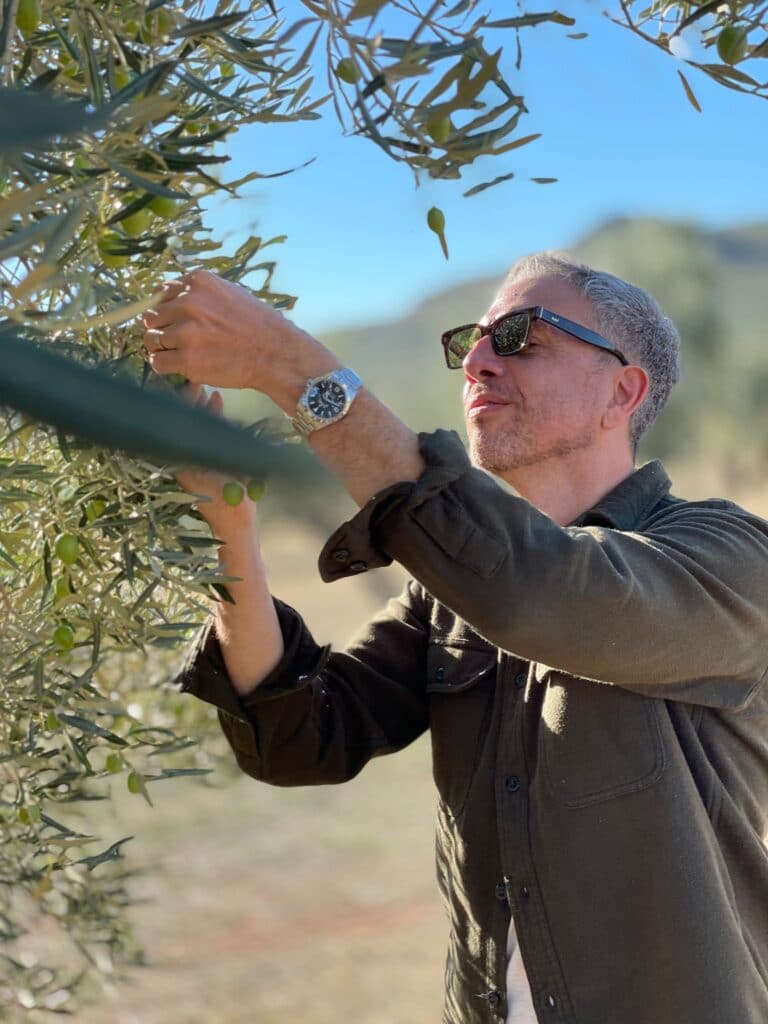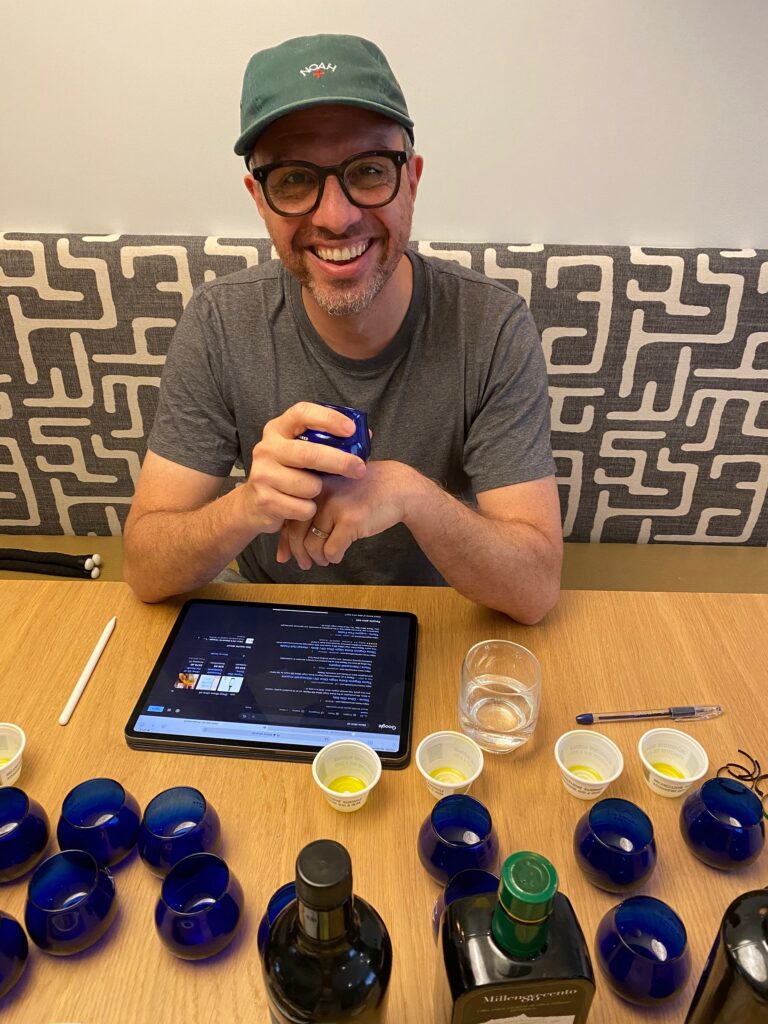Olive oil is an omnipresent and essential part of the kitchen pantry and the Mediterranean diet.
From the flourishing olive groves and olive oil mills scattered throughout the Italian countryside, to the do-it-yourself-ers pressing batches from a few trees on their land, olive oil is something that cannot be defined by its name alone. With some olive oil lovers preferring tradition and others leaning more towards the technical side comes discourse, often as spicy as a peppery olive oil.
Enter Fil Bucchino, an extra virgin olive oil expert and certified taster, who was taking a break from touring with his punk band in Tuscany when he unexpectedly found his passion for this liquid gold.
His olive oil obsession led to creating a documentary about the stuff, and what started as a fervent passion soon became his life. Eventually, Bucchino became the only Canadian member of the Italian National Directory of Virgin and Extra Virgin Olive Oil Experts, a contest judge, and one of a few tasters worldwide enrolled in the ONAOO International Register of Professionals before becoming an extra virgin olive oil producer himself.

Fil Bucchino recently presented an olive oil masterclass as a part of ICCO Canada’s Lazio Marketplace, presented in collaboration with Unioncamere Lazio, the regional Union of Lazio Chambers of Commerce. We sat down with him afterwards to talk about the markers of quality olive oil, music and community.
Olive oil is an indisputable part of growing up in an Italian family. Were your parents also olive oil obsessed?
Growing up, I had a few friends that had a pool in the backyard, and they never used it, because when you have a pool, you don’t think about it. In the Mediterranean, people are surrounded by olive trees and olive oil and don’t even think about it. When we left Italy, my father and mother really started missing olive oil from back home, so they started importing it for themselves. When I’d be away on tour, my father would always send me new oil as it would come out. I would look forward to every harvest because I’d get together with my friends and cook with it. The conviviality part of it was important, as music is not an easy path. Though I’m not sure the oil was of any quality, the tradition felt good.
On tour? You were in a band?

I spent 10 years touring in a band — we even had a record deal. We all see music as a listener, but we don’t see music from the other side, and with olive oil it’s the same thing. I change between olive oil and music a lot because music heals in ways and olive oil heals in other ways.
What are some of the health benefits of olive oil?
When unrefined and properly produced, extra virgin olive oil is one of the healthiest oils. Fats carry the same amount of calories, it doesn’t matter how you put it. But quality extra virgin olive oil has an entirely different set of characteristics than olive oil or refined light olive oil, as it is full of polyphenols. I fry with extra virgin olive oil all the time.
Polyphenols are both antioxidants and anti-inflammatory compounds. Antioxidants are the first line of defense against free radicals and oxidation — not only in the olive oil, but in our bodies at a cellular level. Our cells age over time, and having a diet full of antioxidants can help keep you healthy. One of these polyphenols is called oleocanthal, which is responsible for the tingly sensation we feel in the back of our throat when tasting olive oil, is also called “nature’s ibuprofen”. Hydroxytyrosol is another one which is generated during olive ripening to protect against pathogens and herbivores and is shown to have positive effects on human health.
Also, extra virgin olive oil lowers our bad cholesterol (LDL) and increases our good cholesterol (HDL) because it is composed of 70 to 80 per cent monounsaturated fats.
You can fry with extra virgin olive oil? What about the smoke point?
The smoke point is higher than the typical deep frying temperature, so you’re good to go. The polyphenols also help keep the oil stable, slowing down the chemical change caused by heat. The talk about how you shouldn’t fry your food in olive oil is unwarranted, as it is more about the oxidative stability than the smoke point.
How is olive oil a part of the often-recommended Mediterranean Diet?
Olive oil is the first thing to hit a pan, and is usually the last thing to finish a dish. So Mediterranean food is almost like an olive oil sandwich. The Mediterranean Diet consists of very little meat and fish, and is mostly vegetables, fruits and whole grains. Mix in some olive oil and all of a sudden, you’re having an antioxidant feast.
What makes olive oil ‘extra virgin’?
Extra virgin olive oil can have no defects and has to have a level of fruitiness in the aroma and taste above zero. Think of it as a freshly squeezed raw olive juice — it needs to taste and smell fruity and “green”. Whether the “green” is a berry or an artichoke or an almond, it needs to feel fresh. The second quality indicator is that you want it to be bitter, ideally in a good way like a coffee or a dark chocolate. Lastly, olive oil should be pungent. There should be a peppery sensation that tickles the back of your throat from the bitterness and pungency, which indicates the presence of polyphenols. It’s important to note that colour has no bearing on the quality. So we rule out colour when tasting extra virgin olive oil.
If you have the slightest hint of a defect, you cannot call it extra virgin olive oil anymore. Virgin olive oil still has to have a level of fruitiness but it’s permitted to have a small amount of defects, which can rank up to 3.5 on a scale of 10.
When we talk about regular olive oil or light olive oil, we’re already talking about a refined product. These are made with lampante or lamp oil to start, meaning that they are highly defective or have no fruit whatsoever. For these, they are deodorized, decolorized and blended with a little bit of virgin or extra virgin olive oil, but there is no comparison.
What defects are found in olive oil?
Oil with a barnyard, swamp-like or wet compost smell is considered fusty. This refers to the anaerobic fermentation process that happens when olives sit in heaps for long periods of time prior to extraction.
Rancidity refers to the breakdown of fat molecules in an olive oil. As any oil ages, it oxidizes, and the resulting smell is similar to crayons or old walnuts. Storing olive oil in a dark, cool, dry place slows this process down.
Winey olive oil has gone through aerobic fermentation, which produces a wine-like or vinegary smell.
Musty essentially means “moldy”, which is a defect often derived from olives that were stored in humid conditions prior to extraction.
Muddy sediment is one of the foulest defects, caused by vegetable water residues and organic sediments left in the oil through improper filtration or decanting, or from extraction or storage in mills that were not properly cleaned.
During your Lazio Marketplace olive oil masterclass, attendees tasted olive oils from the region. What’s notable about olive oil from Lazio?
Lazio has four olive oils produced with the coveted DOP designation — Tuscia DOP, Sabina DOP, Canino DOP, Colline Pontine DOP.
Lazio has 14 unique olive cultivars, but a few are more distinct to the region. One of them is the Caninese, which is from the north side of the region, and has notes of almond and fresh cut grass. You also have the Itrana, which is one of my favourite ones because it has tomato, artichoke and green almond sensory notes. The Carboncella has a slight chili scent with a sweet almond aftertaste.
Some of the most popular cultivars in the region are the Moraiolo and Frantoio, which are very bitter with artichoke, almond and pepper note, but these are also found in other parts of central Italy such as Tuscany and Umbria.
What is the proper way to taste extra virgin olive oil?
Us human beings tend to be affected by things by colours and smells, so if you see an oil that looks like kryptonite, like bright, bright, green, you might go “Oh my gosh, that was amazing. It was so green! It was so delicious,” so we use blue coloured glasses to disguise the colour of the oil. It’s important to warm the base of the cup in the palm of your hand to help release the oil’s aromatic compounds. This also increases the reaction speed between the oil and our body’s receptors. When sipping the oil, we use a method called strippaggio — you suck in air to oxygenate the oil, stimulate retro nasal olfaction and help separate the oil from your saliva, giving your taste buds direct contact. Strippaggio helps draw the aroma into the back of your throat and up into your nasal cavity, which stimulates entirely new flavour sensations. It’s not uncommon to cough, especially when tasting oils that are more pungent and higher in polyphenols.

When buying olive oil, what should we look for on the label?
Read the label, even if you don’t know how to read Italian. The finest producers will proudly put the harvest date and cultivars on the label. Olive cultivars are varieties of olives achieved through selective breeding. When making olive oil, the cultivar has a significant impact on the sensory profile. You might also find a “use-by” date, but this is less helpful as it’s typically 18 months from bottling. As a result, the harvest date is more important.
Also avoid anything in a clear bottle or tin, no matter how interesting it looks. These vessels speed up the oxidation process which causes olive oil to lose its flavour and aroma. Oxidation is also why olive oil doesn’t age well — it has more in common with a fresh juice than it does with a wine that way.
What are some of the enemies of extra virgin olive oil?
Light, heat and oxygen all speed up the oxidation of extra virgin olive oil. Never choose an olive oil in a clear bottle because it is not protected from light. But I’d also say that education and tradition are some of the biggest enemies. Making olive oil is technically really easy, but making quality olive oil is not. To make a good oil, there’s 1000 complications and 1000 things that can go wrong — whether it’s the ripeness and health of the olives at harvest, the harvest method, the cleanliness of the mill, the expertise of the miller, the temperature of the olives at extraction, and so on.
We often confuse tradition with subjective emotions, and often the most “traditional” olive oil is stored in a tin and is unfiltered. This helps oxygen and the organic sediments do their job, accelerating the inevitable oxidation of the olive oil.
How do your passions for music and olive oil collide?
My love for both of them is rooted in community and the art form. With music, you go to a show because you want to run into friends that you haven’t seen in a long time and share an experience together.
With olive oil, it’s the same thing. One of my favourite things about harvest is the first taste, when the first oil comes out and the whole community comes out to try it. At our grove, we also celebrate with an end of harvest lunch, rain or shine. The conviviality is everything.
This interview has been edited and condensed.



Add a comment